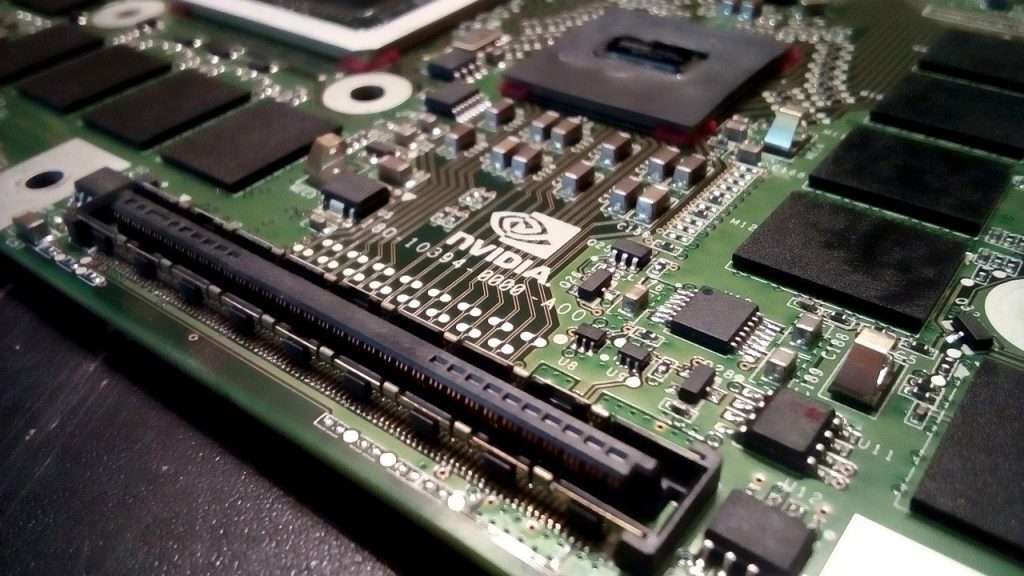Under normal circumstances, US tech giant Nvidia’s takeover of British chip designer Arm for US$40 billion (£29 billion) would have sailed through without registering beyond the computing industry. Instead, it has made international headlines, with UK and EU monopolies regulators launching an in-depth investigation after outcry from competitors.
In effect, the deal is pretty much dead before it starts. At the heart of this lies a row about technological sovereignty. So what is going on?
If you are a serious gamer, you’ll probably know Nvidia. It predominantly makes graphics processing units, or GPUs – chipsets traditionally used for graphic rendering and virtualisation, which is how computer games create lifelike worlds. GPUs have been a niche market compared to the traditional microprocessors made by companies like Intel, worth about US$20 billion a year versus over US$80 billion for microprocessors.
But a few years ago, some smart people figured out that GPUs are also great at machine learning and cryptocurrency mining. Amazon, Facebook, Google and Tesla have all become customers of Nvidia, and its share price has surged since 2019. The company is now worth over US$350 billion, making it the 14th largest in the world.
Nvidia share price chart

Why Nvidia wants Arm
Arm is a bit more complicated. It doesn’t manufacture anything, but develops and designs the architecture of processors. It licenses this intellectual property to companies like Samsung, Nvidia and fellow chipmaker Qualcomm. They in turn sell components to Tesla, Apple and other final users.
Arm receives both licence fees and royalties based on eventual production volumes. Think of it like an author making money from a book publisher. You get paid by Random House on how many books you sell through Amazon, but besides the manuscript, you don’t control anything at all.
Arm is a big deal because it has captured more than a 90% share in the mobile market. That is, almost all mobile phones today are based on Arm’s architecture. Whether it’s a Samsung, Huawei or iPhone, at the most basic level, they have the same origin.
Nvidia’s interest in a takeover is reminiscent of Microsoft purchasing GitHub in 2018. GitHub provides a code-sharing and publishing service that’s akin to Reddit for software programmers.
GitHub’s open-source approach has made it the Library of Alexandria for code examples. Microsoft won’t be receiving much immediate financial payback from the purchase. Instead, it is gaining access to the legions of developers who use GitHub’s code repository products on a daily basis. This data can then feed into Microsoft’s development and research. Which is, of course, where the next blockbuster will hopefully come.
This is what Nvidia wants as well. It has been riding high on the wave of artificial intelligence, but has to diversify away from being a one-hit wonder that makes only GPUs.
Yet it is always risky to diversify into new areas. Going into healthcare or self-driving cars like Google? What about mobile payment and mobile services like Visa and Mastercard? A business-to-business model has served Nvidia pretty well. In this respect, Arm is a great fit.
Arm is supplying technologies in almost every application related to smart devices. An acquisition would give Nvidia a deep understanding of the general trends across various sectors, on a monthly, if not daily, basis. Who wouldn’t want such real-time intelligence? The question is why no one figured it out earlier.
Alas, regulators won’t let it happen.
Why it won’t happen
Upon the announcement of the agreement in September, Nvidia and Arm said they would need green lights from regulators, including those in the US, Europe and China.
This is despite the fact that in theory, Nvidia and Arm do not compete with one another directly. By this narrow definition, the merger doesn’t look “anti-competitive” according to the standards employed around the world.
The EU appears to have greater concerns, however. It worries that the merger would mean Arm would lose its impartiality when licensing technologies. Would Arm favour Nvidia if it started competing in the automotive sector against Bosch in Germany, for instance?
Such worries are reasonable but remain hypothetical. The biggest pushback, behind the scenes, actually appears to be from China. Ever since the US blacklisted Huawei and other semiconductor manufacturers in China, Beijing has been obsessed with becoming technically “self-sufficient”.
While it works towards this goal, Arm has continued to license its chip architectures to Huawei. Arm claims that its chip technology is of British origin and therefore does not breach the US restrictions on exporting tech to a group of blacklisted Chinese companies. Thanks to this ongoing arrangement, Arm is one of the remaining enablers for China’s semiconductor sector to keep pace with the outside world.
The standoff between US and China is unlikely to change during the Biden administration. Huawei CEO Ren Zhengfei has reportedly said as much, for instance. This is why Beijing will never let the takeover go through. If that happened, Arm would effectively become a US company, and the export restriction would naturally come in. For similar reasons, the Chinese effectively stopped Qualcomm from buying Dutch chipmaker NXP Semiconductors in 2018.
The world of Silicon Valley has been built on openness. Knowledge and ideas have to flow freely to deliver technological miracles. But rightly or wrongly, governments see things as a zero-sum game. The tech war and economic rivalries have put a very dedicated industry into sharp geopolitical focus.
The reality is that our human progress over the past few decades has been advanced by the rise of computing power. The last thing we need right now is for exponential technology growth to vanish. For the world to combat climate change, the pandemic and global recession, we need technologies to deliver more solutions, not less. Preventing a tie-up like Nvidia/Arm potentially stands in the way of that.
- is Professor of Management and Innovation, International Institute for Management Development (IMD)
- This article first appeared on The Conversation
